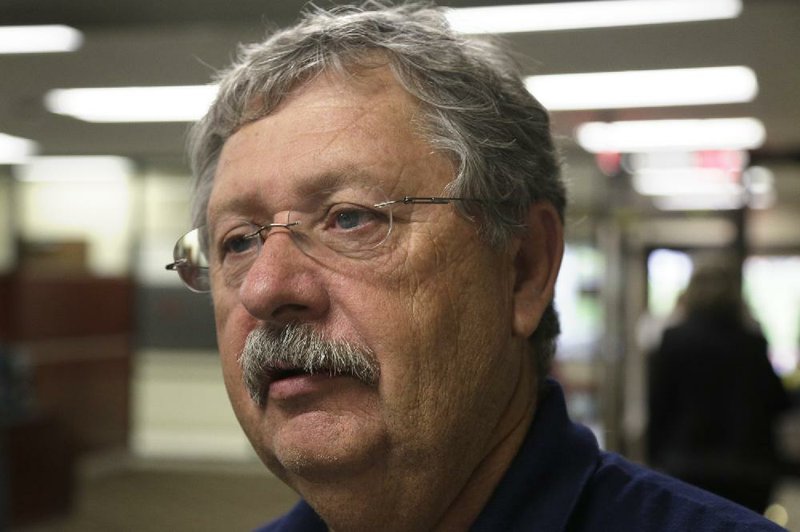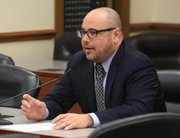Unless there are major changes, Arkansas' prison population will grow rapidly over the next decade, a consultant told the state's Criminal Justice Oversight Task Force on Wednesday.
Wendy Naro-Ware, vice president of JFA Associates, said the state's prison population was 13,470 in 2004 but climbed to 17,850 in 2014. She projects it will climb as high as 25,671 in 2025. "At best," the population will climb to 20,689 for a 16 percent increase, she said.
JFA Associates, a nonprofit research institute that evaluates state and federal correction systems across the nation, has been tracking Arkansas' prison growth for several years.
The state paid $60,489 for this year's report and presentation, with the state departments of Correction and Community Correction and the Arkansas Sentencing Commission splitting the cost.
"By percentage, you were the fastest-growing prisons in the country [in 2013] ... growing seven times the national average," Naro-Ware said. "You're still growing faster than you ever have collectively in the past. ... This is what will happen if changes are not made."
After hearing that a "flat" prison admission rate would result in the 16 percent prison population increase, Benny Magness, chairman of the Board of Corrections and a committee member, said, "Well, we have to go less than flat."
"I agree," said state Sen. Jeremy Hutchinson, a Little Rock Republican chairing the task force.
As of Wednesday, there were 15,666 inmates in state prisons, putting the state facilities at 106.7 percent of capacity. There were another 2,694 inmates being held in county jails across the state waiting for a bed to open up in the state's prison system.
Hutchinson pointed out that the projections do not take into account the new laws passed this spring aimed at curbing recidivism, such as increasing funding of drug courts and broadening drug and mental health treatment for parolees, but said the figures were still startling.
"It's overwhelming. The projections for 2025 are equally daunting, but I think we'll have impact on [parolee] behavior in things we did last session," Hutchinson said. "I think it clearly shows we have to do more."
From 2004 to 2010, the state's prison population grew from 13,470 to 16,176, prompting a series of changes to state law meant to bring the numbers down.
Act 570 of 2011, which raised the thresholds for felonies in some property and drug offenses, coincided with a drop in prison population, going from 15,035 in 2011 to 14,627.
But in 2013, things changed.
A series of stories in the Arkansas Democrat-Gazette highlighted failures in the state's parole system in the handling of an eight-time parole absconder, Darrell Dennis, who went on to kidnap and murder a teenager in Little Rock.
Magness, along with the rest of the Board of Corrections, enacted a sweeping set of new policies meant to crack down on the failure of ensuring parolees meet their release requirements, one of which automatically sent a parolee charged with a new felony or sex crime back to prison before the new charges were adjudicated.
In 2012, the prisons took in 1,726 parole revocations. In 2013, that figure ballooned to 4,005.
In addition to her task force presentation Wednesday, Naro-Ware also shared her findings withe the Board of Corrections at its regular meeting Tuesday held in Calico Rock.
"Parole violators are the big story," Naro-Ware told the board. "I've never seen anything like it. I cannot stress how big of a deal this is."
Magness said at the board meeting that the problem lies not in the policy but in "the inmate committing the crime."
Community Correction Department Director Sheila Sharp pointed out that the board policy places violators in prison only upon arrest and not conviction.
"I can fix that problem today," board member Buddy Chaddick said.
Magness told the board that he was resistant to automatically changing the policy without having "swift and certain" alternative sanctions in place for parole and probation violators.
"Sometimes we have short memories and we forget what we were fighting against when we set policy in the first place," Magness said. "They have to be held accountable. It doesn't have to be prison, but it has to be something."
The increase in parolees also coincided with a 17.5 increase in new sentences, going from 4,437 in 2013 to 5,214 in 2014.
"You increased the number of parolees being returned. ... That's extremely substantial," Naro-Ware said. "I can't stress how substantial that is. In fact, I've never seen anything like it."
At the Wednesday task force hearing, Saline County Prosecuting Attorney Ken Casady said the new policies put into effect by Magness were "common sense" steps to correct a system that was woefully out of hand.
"It was a direct result of common sense. ... Previous to this, what the situation was you had a person arrested for potentially violent or dangerous things and [parole policies] called [for] them to write an essay or get a slap on the hand," Casady said. "The public outrage hit the pinnacle with the Darrell Dennis case. ... The situation has corrected itself with legislation and board policy."
But that correction, Sen. Joyce Elliott said, is clearly untenable.
The Little Rock Democrat said that she was troubled that Arkansas is the only state in the country that sends parolees back to prison on a new charge, but no conviction, and she said that there are plenty of nonviolent offenders being treated as equals to violent offenders in regard to risk.
"Why not some common sense in that distinction?" Elliott asked members of the task force. "Why do we treat them the same way? I'm failing to see the common sense of that."
Hutchinson, like Elliott, thinks there's a better approach but that it will be the work of the task force to figure that out.
"I think [the policy] went too far," Hutchinson said. "I don't think going back 100 percent the other way makes sense either, but I think there does have to a happy medium."
Naro-Ware told the Corrections Board on Tuesday that every state has their "anecdotal horror story" of a parolee gone wrong, but cautioned against setting policy that cast too wide a net. She suggested that the individual cases be reviewed a "little more in depth" to determine whether the offender is a career criminal or should be given another chance.
"Use that to set your policy," she said.
Despite rising prison numbers, Naro-Ware report showed that Arkansas' probation figures are set to slowly drop, going from 29,206 probationers this year to 25,612 in 2025.
For parolees, the state will see a modest long-term bump from 21,573 this year to 21,890 in 2025.
After the task force meeting, Elliott said that she's worried that political interference has exacerbated problems.
"I think there needs to be some space for the Parole Board to use more common-sense polices," Elliott said. "They're very hampered by politics rather than their abilities to put good policies in place."
The task force will look to tackle different concerns that could help bring down the prison numbers, including matters ranging from changes to the state's sentencing laws to expanded clemency for older prisoners.
It meets again next month.
Metro on 06/18/2015




